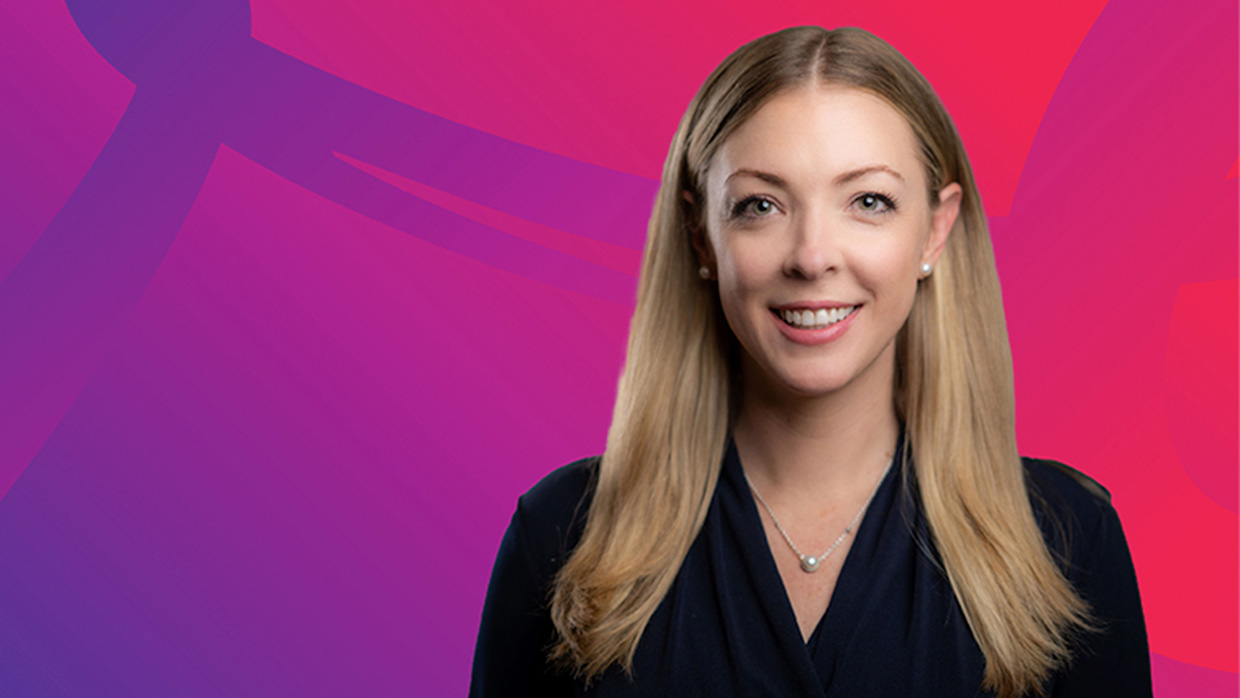Women's History Month: A Conversation With Belinda Oakley, CEO

We spoke with Belinda Oakley, Chief Executive Officer, North America, about her first months at Sodexo Live! and the future she sees for the next generation of women leaders.
Interviewer: What have you learned during your first couple of months at Sodexo Live!?
Oakley: It's been truly fantastic to be on the road for my first few months. Over the past nine weeks, I've traveled to 11 states and spoken with over 100 team members in fireside chats. The first thing that stands out is the diversity of our portfolio. Where else could you go from eating fan-favorite hot dogs from a concession stand to Michelin star-worthy experiences at a convention center and then a curated event in a cultural destination? It is incredible to see how our teams and culinarians can completely reinvent a guest's experience daily, always creating and challenging the status quo.
I've also learned that our values of team spirit, service spirit, and spirit of progress aren't just a message in the breakroom somewhere. They are alive and well all over the Sodexo Live! business.
Interviewer: What are some of your goals for Sodexo Live! in the next year?
Oakley: This one is simple for me, even though it's not a simple question. As a leader, my goal—and I believe my responsibility—is to ensure that we move closer to fulfilling our full potential every year.
First, we want to be an exceptional place to work that attracts the best talent. We want the best for that talent in return. At all levels of the organization, we never compromise our values.
Next, growth in all categories! Revenue and profit growth from great people making great choices and market growth from delivering on our promises today and leading the industry tomorrow. The decision to renew or choose Sodexo Live! should be simple. And then there's competence growth—for every employee personally and functionally across the organization. The pace of change is faster than it's ever been and as slow as it's ever going to be. Collective intelligence counts for future success, and that takes having a beginner's mind in all roles.

Interviewer: What can leaders today do to empower the next generation of women leaders?
Oakley: Hire a female CEO? Just kidding… kind of. The reality is one of the most empowering decisions we make is to create gender and diversity balance in leadership teams. Overall, I think the most important thing a leader can do to empower women and minorities at work is to connect with our teams, listen to our people, and selflessly promote our future talent no matter where it takes them. The leaders who have put their great people before me as I've been traveling are the most memorable. You can tell a lot about a leader by how they elevate and encourage their people.
I aspire to influence the frequency with which leaders sit down with teams and peers to discuss the tough issues that have no quick fix or right answer. If, as a society, we did more listening with more empathy and applied more collective creativity, I think we could move the needle in countless areas of disparity.
Interviewer: We've seen some progress for women in the last year— the number of female CEOs has reached historic highs, several states elected their first female senators and governors, the U.S. women's national soccer team reached a historic settlement in their lawsuit over unequal pay. What does this representation mean for women?
Oakley: I think it's absolutely a good thing. On the topic of soccer, I was listening to Abby Wambach's "Wolfpack" recently, and I loved a story she told at the beginning where she was asked to speak at a convention that was going to be attended by a predominantly male audience. As part of her briefing call, one of the meeting planners questioned whether Abby could think about making sure her language was 'inclusive' for the male audience, conscious of the gap attendees may have in connecting to her as a woman. He asked Abby whether she thought that was a fair ask. Abby responded that it was absolutely a fair ask if he had asked that question of every male speaker they had ever hosted on behalf of the female attendees. She goes on to speak about how hard women have had to work to 'see themselves' in society's leaders and heroes. From protagonists in movies and books to corporate and community representatives, and of course, athletes on television.
As a mother to two little girls, I'm thrilled to see the landscape changing. What might the future look like with little girls all over the world being able to imagine themselves in roles that have traditionally been occupied by people who didn't look like them?
Interviewer: Why is Women's History Month important to you? Is there a woman from history that you find especially inspiring?
Oakley: I think history, in general, is incredibly important. It helps us understand what got us here and how far we have come and lends perspective to how much further we might have to go.
Looking back over history, there are so many incredible stories of women who have come from nothing to change everything and those who rose to positions of power and impact who used their privilege to better things for others. These are often the narratives I am most inspired by because I feel so bloody fortunate every day to do what I do with the heart I have for it.
One of the most impactful quotes I've ever read was from a book by Marianne Williamson, where she calls us to stop "shrinking so that other people won't feel insecure around us" because "as we let our own light shine, we unconsciously give other people permission to do the same." This has been an everyday inspiration for me for over 20 years. I refuse to believe that women should wait for a sign or that we should see ourselves inhibited by the pace of change around us. Be you, fiercely. And when you get where you thought you could never go, turn around, and lend that light you've shone to those coming through behind you.